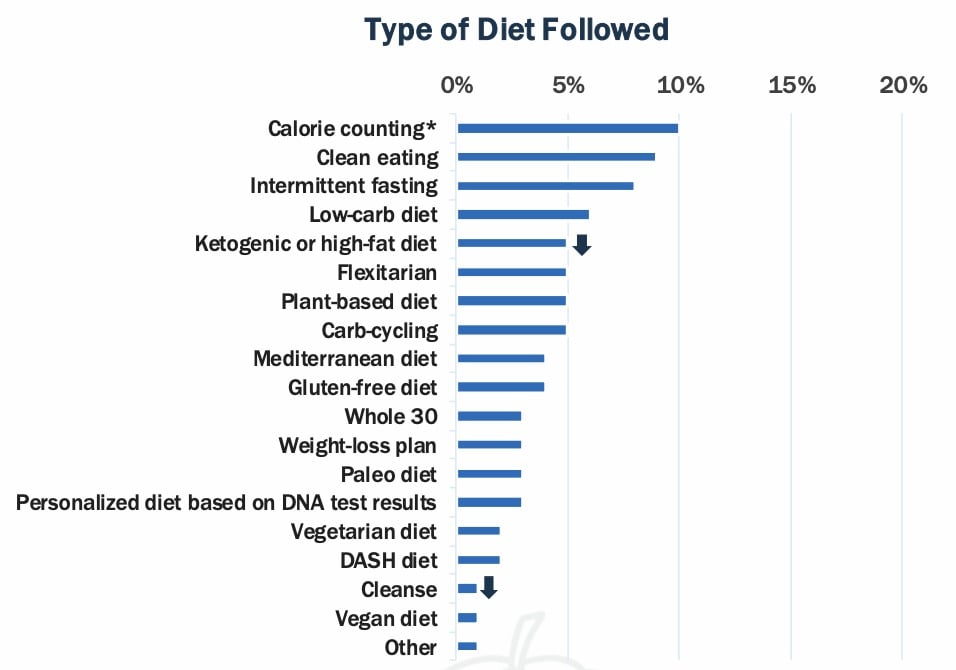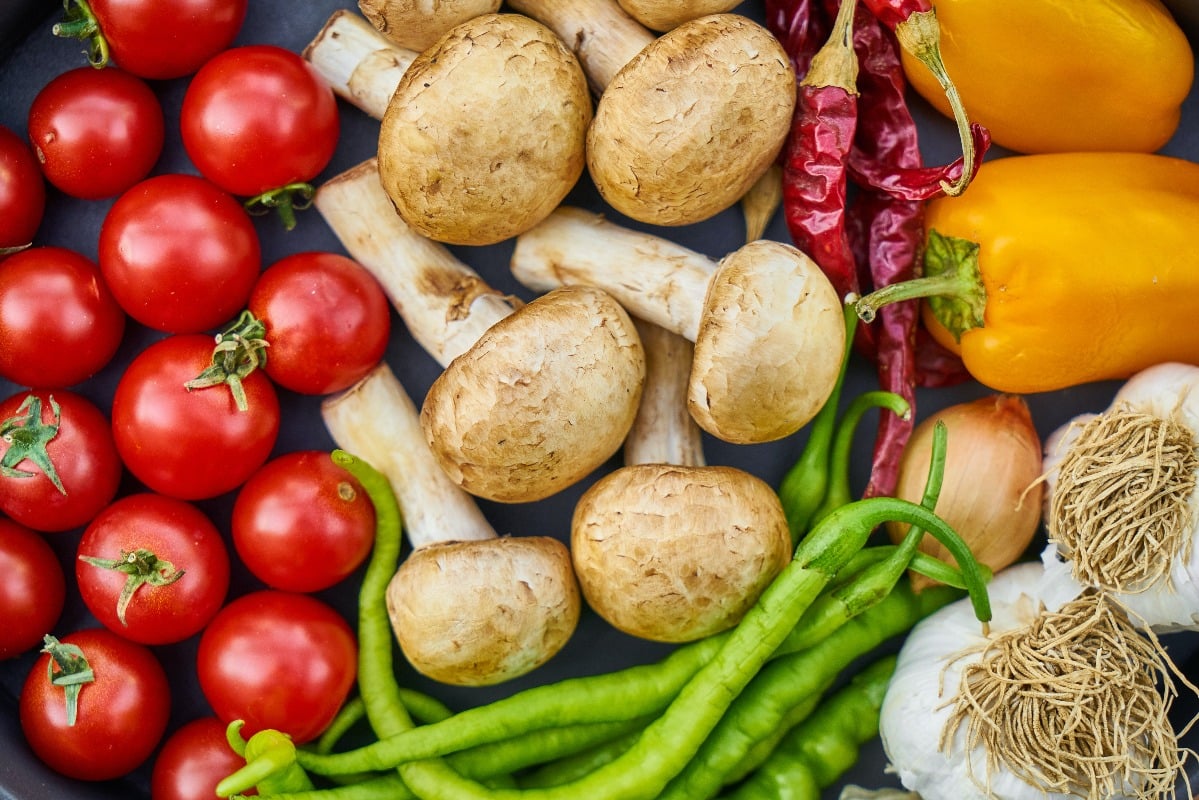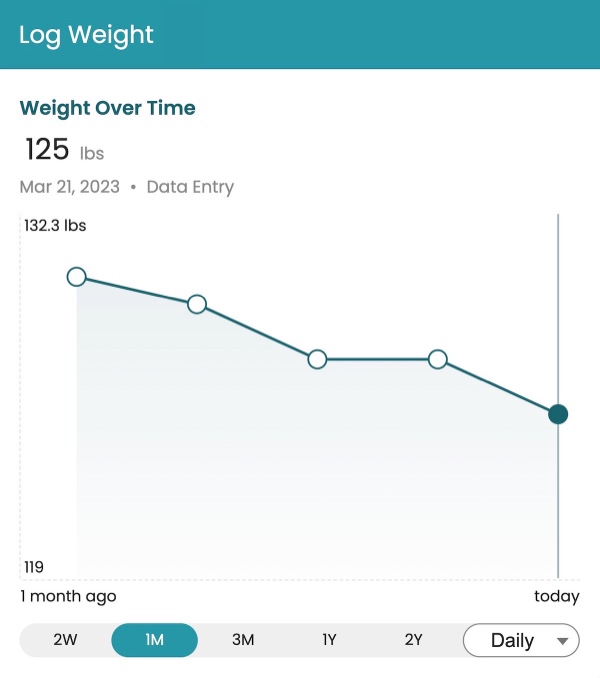
With the rise of social media, body image insecurity has pressured many to lose weight and lose it fast. In response, influencers and social media accounts have resurfaced or created all kinds of different diets. Some are drastic and can be deadly, like the tapeworm diet, where people swallow tapeworm cyst pills in hopes of the worm consuming all food in their intestines. Other diets can be as simple as cutting down on the consumption of a particular food. Hundreds of health trends have gained traction over the years, and sorting through them can feel overwhelming.

Many of the diets you read about on TikTok or Instagram probably aren't doctor-recommended, and you shouldn't attempt any abnormal diet before talking with your healthcare provider. Even diets with more credibility and research behind them can be dangerous for people with certain conditions or nutritional deficiencies. Although this article includes science-based research, it does not serve as a recommendation.
Intermittent Fasting

One popular diet trend studied quite a bit is intermittent fasting. The practice of fasting has been around since before 500 BC. Fasting has been a part of numerous religious ceremonies and holidays, like the Jewish holiday, Yom Kippur, and has been used throughout history as experimental treatments for several illnesses. Intermittent fasting is when someone restricts their food and liquid intake for an extended period. There are three common routines followed while intermittent fasting:
- Fasting daily for 16 hours
- Fasting 24 hours on alternating days
- Fasting twice a week on nonconsecutive days
This method of dieting, like most, has its pros and cons. On the positive side, multiple pilot studies showed improvements in body weight and blood pressure when practicing intermittent fasting. Another study from 2019 observed the benefits of daily 16-hour fasting in college-age men and saw a trend of lower body fat and blood pressure and an increase in HDL cholesterol (good cholesterol) in those that followed the diet. Another study, also mentioned in our Longevity Cheat Sheet, observed longer lifespans in those who practiced intermittent fasting for more than 5 years after recovering from cardiac catheterization.
When comparing the paleo and Mediterranean diets to intermittent fasting, scientists found that intermittent fasting led to greater weight loss than the other two. That being said, the same study found that most participants could only keep up with fasting two days a week, and even less could keep their calorie intake as low as the recommended amount, a common trend of this restrictive diet. An additional drawback of intermittent fasting is that during periods where people aren't fasting, they tend to overeat, making it harder to maintain weight loss. This diet can also be unsuitable for people with certain health conditions like diabetes or who take blood pressure or heart disease medication.
Main Benefit: has shown to lower body weight and blood pressure, and increase HDL cholesterol
Main Drawback: Very restrictive and could lead to overeating during non-fasting periods
Ketogenic (Keto) Diet

You may know multiple people who have embarked on this diet, or you've probably seen new advertisements for "Keto-friendly" snacks, substitutes, and even restaurants. That is because the ketogenic diet has quite recently skyrocketed in popularity. Like intermittent fasting, the keto diet has been around for a long time. In the 1920s, the keto diet began being used to treat epilepsy and was showing promising results. However, after several decades, it became overshadowed by the rise of antiepileptic drugs, only to be uncovered several years later and branded as a weight loss diet.
The diet recommends consuming carbohydrates as 10% of your daily calorie intake, protein as 20%, and fats as the remainder. The goal is to have your body rely on breaking down fat stores for energy instead of carbohydrates to decrease body fat. One study of 349 patients with type-2 diabetes found that those who followed the ketogenic diet lost around 10-15% of their body weight. That being said, most of this diet's rapid weight loss is a result of water loss. Other short-term research showed that the ketogenic diet resulted in an increase in physical performance and a decrease in insulin levels (a hormone that helps regulate blood sugar). With all of that in mind, the primary concern of this diet is higher LDL cholesterol levels.
In addition to high LDL cholesterol, the keto diet has several more downsides. Like intermittent fasting, this diet is restrictive and has a high dropout rate. Additionally, weight loss during the keto diet can be hard to maintain. Multiple symptoms can also occur from a lack of carbohydrates, such as headaches, constipation, diarrhea, and vitamin deficiency.
Main benefit: has shown to increase weight loss and insulin levels
Main drawback: has shown to increase LDL cholesterol levels, this diet is also difficult to maintain
The Paleolithic (Paleo) Diet

What if we ate like humans did before processed foods and agriculture? If we ate instead like our hunter-gatherer ancestors from the Paleolithic age? Just from this introduction, you can probably guess what the goal of a paleo diet is. The paleo diet surrounds the concept of eating like our hunter and gatherer ancestors. To the non-historian, this means avoiding foods like dairy products and grain while focusing on consuming healthy fats from foods like meat, fish, raw vegetables and fruits, olive oil, and eggs.
To test the plausibility of the paleo diet, scientists studied several inactive, overweight individuals for eight weeks on this diet. They found that multiple cardiometabolic disease risk factors decreased while on the diet. For example, the levels of leptin, a hormone that promotes the feeling of hunger and is found at lower concentrations while losing body fat, were reduced by 56.2%. A different study found that the paleo diet resulted in lower blood pressure, weight loss, and a lower ratio of total cholesterol to HDL cholesterol for those with metabolic syndrome.
One common concern for people on the paleo diet is a lack of calcium and fiber. The study addressing the benefits of the paleo diet for those with metabolic syndrome found that participants' calcium levels decreased by 50%. You can manage these risks by eating more calcium-rich foods or with artificial supplements. Additionally, like the other diets mentioned, many people find the paleo diet quite restrictive and hard to stick to.
Main benefit: shown to decrease body weight and lower your risk of multiple cardiometabolic disease factors
Main drawback: at risk for calcium and fiber deficiencies, this diet is also quite restrictive
The Vegan/Vegetarian Diet

Humans have relied on animal-derived products since the dawn of man. Even so, vegan and vegetarian lifestyles have been around for quite a bit of time; I'm talking centuries. One of the earliest notable vegetarians was the Greek mathematician, Pythagoras, whose Pythagorean theorem is still used today. In this modern-day, approximately 3% of the US population is vegetarian, and 1% is vegan. A vegetarian diet includes fruits, vegetables, legumes, nuts, seeds, and grains. The only restriction associated with this diet is meat consumption. Vegan diets, on the other hand, restrict the consumption of all animal products, so honey, eggs, and dairy are also off the table.
Many people choose this diet for ethical or environmental reasons, but it also has its health benefits. Multiple studies have shown that a vegetarian diet is correlated to increased longevity and a decreased risk of mortality for cardiovascular disease, diabetes, chronic kidney disease, and cerebrovascular disease. This results from less consumption of fats, red meat, cholesterol, animal protein, and heme iron. Red meat and processed meat, in particular, have been linked to an increased risk of cardiovascular disease, obesity, and gestational diabetes. In addition, when compared to the paleo and gluten-free diets, scientists found that the vegetarian diet was the most adhered to.
Keeping all of this in mind, there are a few points of caution for this diet. The first is that excluding meat and animal products can lead to a more challenging time obtaining certain nutrients. Nutrients like Vitamin B12, protein, iron, zinc, calcium, vitamin D, and essential fatty acids must be supplemented into your everyday diet. Lastly, there is quite a bit of variation within a vegetarian diet, so make sure to plan your diet out with a trusted medical provider to get the complete list of benefits.
Main benefit: correlated to longer longevity and a lower risk for several common diseases
Main drawback: can lead to deficiencies in several nutrients if not intentionally supplemented
Gluten-Free

For those with Celiac disease, this diet is imperative. Gluten, a group of proteins typically found in wheat, barley, and rye products, can make those with this disease bloat, vomit, experience abdominal pain, and more. A Gluten-free diet has also appeared to lessen some symptoms in people with irritable bowel syndrome. Even though this diet was mostly created for gluten-intolerant people, it has become an enormous trend. A trend big enough that, in 2016, 15.5 billion was spent on gluten-free food sales. So, is there a benefit for people who don't necessarily need to be gluten-free? Well, one study found that people who followed this diet for over a year saw lower waist circumference, higher HDL cholesterol, and weight loss. However, no causation could be established from this study, mainly because people who followed a gluten-free diet already tended to be more health-conscious.

As great as that sounds, this diet is expensive. Researchers found that gluten-free products cost 183% more than their gluten counterparts. In addition, in an attempt to create a more appealing taste and texture, several studies show that these products have increased lipid, protein, trans fat, and salt levels. Another drawback is that many gluten-free products are deficient in several nutrients, including fiber, folate, iron, niacin, thiamine, and riboflavin. So, similar to vegetarians, people going gluten-free should ensure they get the nutrients they need.
Main benefit: shown to lessen symptoms for Celiac disease and Irritable Bowel Syndrome
Main drawback: expensive, some gluten-free products contain unhealthy ingredients, and there is a risk of nutritional deficiencies if not supplemented
The Mediterranean Diet

Just the name of this diet brings to mind images of white sand beaches, freshly caught fish, and a glass of red wine. It's a lifestyle that incorporates food typically found in, you guessed it, the Mediterranean. This includes foods like brown rice, fish, nuts, legumes, olive oil, fruits, and vegetables. As fanciful as it all seems, this diet actually has its benefits.
One meta-analysis of this dietary pattern found a lower risk of overall mortality, cardiovascular mortality, and cancer. Multiple studies showed this diet benefited blood pressure, lipid metabolism, and obesity. Another study found that the Mediterranean diet decreased inflammation, an immune response that, if chronic, can lead to diabetes and heart disease.
In one study, the Mediterranean diet did not result in higher weight loss than intermittent fasting. However, it did result in higher weight loss than the paleo diet after 12 months and resulted in the best blood glucose control out of the three diets.
Overall, this diet may not have as drastic effects on weight loss, but it is easier to follow, and who doesn't love the idea of eating like you live in Greece.
Main benefit: shown to lower risk of mortality, cardiovascular mortality, and cancer, as well as decrease inflammation, blood pressure, and more. Also, less restrictive
Main drawback: Doesn’t normally have as drastic of an effect on weight loss as other diets
Very-low-calorie diet

This last diet may be the most extreme of them all simply because it is pretty true to its name. To put this diet into perspective, the recommended calorie intake for women in one day is 2000 calories and 2500 calories for men, according to the National Health Service. On the very-low-calorie diet (or VLCD for short), dieters eat 800 calories or less a day.
Now, because this diet is so restrictive, it is usually only recommended by doctors when a severely obese person (with a BMI over 30 or 40) is trying to manage diabetes, preparing for fertility treatment, or preparing for surgery. Because you are consuming less than half the usual amount of calories a day, this diet is never done for more than 12 weeks and requires clinical supervision throughout its entirety. Symptoms of this diet include micronutrient deficiency, hunger, low energy, abnormal bowel movements, dizziness, and more, and it is not recommended for most people. With all that in mind, it has shown promising results for those with type-2 diabetes. In one study, 40% of participants with type-2 diabetes on the VLCD reached remission.
Main benefit: shown to reduce effects of type-2 diabetes on obese patients
Main drawback: Extremely difficult to follow, not recommended for most, and can cause several symptoms
If one or more of these diets interest you after reading this article, don't hesitate to ask your primary care provider if these lifestyle changes are right for you. Many of these diets are restrictive and seem impossible to follow, but talking to your doctor can help you find the support and knowledge you need to succeed. It is also important to remember that any diet you read about or see on the internet may not always be scientifically backed or researched, so it is crucial to always consult a medical professional before trying them for yourself.
It is also key to make sure you are listening to your body. You can do this with symptoms, food, energy, and mood logging.
You can also use tracking apps to help you understand how specific calorie intake or diet changes affect your mental
or physical health. Tracking apps can be especially helpful to see the effects of certain foods on blood sugar,
blood pressure, cholesterol, and specific symptoms when dieting for medical reasons or for disease management.
Changing your diet drastically can lead to side effects, so always pay close attention to your body.

There are millions of diets to choose from and even more ways to personalize them, so why not take the time to decide which is best for you?
Sources:
- Wheless, James W. (2008). History of the Ketogenic Diet. Epilepsia (Copenhagen) 49(s8), 3–5. https://doi.org/10.1111/j.1528-1167.2008.01821.x.
- Morales-Suarez-Varela, María et al. (2021). Intermittent Fasting and the Possible Benefits in Obesity, Diabetes, and Multiple Sclerosis: A Systematic Review of Randomized Clinical Trials. Nutrients 13(9). 3179. 10.3390/nu13093179
- Renteria, Liliana I.; Villalobos, Elias; Waldman, Hunter S.; and McAllister, Matthew J. (2019). Impact of Time Restricted Feeding on Markers of Cardiometabolic Health. International Journal of Exercise Science: Conference Proceedings 2(11)https://digitalcommons.wku.edu/ijesab/vol2/iss11/81
- Michelle R Jospe, Melyssa Roy, Rachel C Brown, Jillian J Haszard, Kim Meredith-Jones, Louise J Fangupo, Hamish Osborne, Elizabeth A Fleming, Rachael W Taylor. (2020). Intermittent fasting, Paleolithic, or Mediterranean diets in the real world: exploratory secondary analyses of a weight-loss trial that included choice of diet and exercise. The American Journal of Clinical Nutrition 111(3). 503–514. https://doi.org/10.1093/ajcn/nqz330
- O’Neill, Blair, and Paolo Raggi. (2020). The Ketogenic Diet: Pros and Cons. Atherosclerosis 292. 119–126. https://doi.org/10.1016/j.atherosclerosis.2019.11.021.
- Mohorko, Nina et al. (2019). Weight Loss, Improved Physical Performance, Cognitive Function, Eating Behavior, and Metabolic Profile in a 12-Week Ketogenic Diet in Obese Adults. Nutrition research (New York, N.Y.) 62. 64–77. 10.1016/j.nutres.2018.11.007.
- Markofski MM, Jennings K, Dolan C, Davies NA, LaVoy EC, Ryan EJ, Carrillo AE. (2019). Single-Arm 8-Week Ad Libitum Self-Prepared Paleo Diet Reduces Cardiometabolic Disease Risk Factors in Overweight Adults. Am J Lifestyle Med 15(6):690-700. https://doi.org/10.1177/1559827619866157
- Boers, I., Muskiet, F.A., Berkelaar, E. et al. (2014). Favourable effects of consuming a Palaeolithic-type diet on characteristics of the metabolic syndrome: a randomized controlled pilot-study. Lipids Health Dis 13(160). https://doi.org/10.1186/1476-511X-13-160
- Marsh, Kate, Carol Zeuschner, and Angela Saunders. (2012). Health Implications of a Vegetarian Diet: A Review. American journal of lifestyle medicine 6(3). 250–267. https://doi.org/10.1186/1476-511X-13-160.
- Rocha, J.P., Laster, J., Parag, B. et al. (2019). Multiple Health Benefits and Minimal Risks Associated with Vegetarian Diets. Curr Nutr Rep 8. 374–381. https://doi.org/10.1007/s13668-019-00298-w
- Cruwys T, Norwood R, Chachay VS, Ntontis E, Sheffield J. (2020). An Important Part of Who I am: The Predictors of Dietary Adherence among Weight-Loss, Vegetarian, Vegan, Paleo, and Gluten-Free Dietary Groups. Nutrients 12(4). 970. https://doi.org/10.3390/nu12040970
- Niland, Benjamin, and Brooks D Cash. (2018). Health Benefits and Adverse Effects of a Gluten-Free Diet in Non-Celiac Disease Patients. Gastroenterology & hepatology 14(2). 82–91. Print.
- Sofi F, Cesari F, Abbate R, Gensini G F, Casini A. (2008). Adherence to Mediterranean diet and health status: meta-analysis. BMJ 337. https://doi.org/10.1136/bmj.a1344
- Michelle R Jospe, Melyssa Roy, Rachel C Brown, Jillian J Haszard, Kim Meredith-Jones, Louise J Fangupo, Hamish Osborne, Elizabeth A Fleming, Rachael W Taylor. (2020) "Intermittent fasting, Paleolithic, or Mediterranean diets in the real world: exploratory secondary analyses of a weight-loss trial that included choice of diet and exercise", The American Journal of Clinical Nutrition 111 (3). 503–514. https://doi.org/10.1093/ajcn/nqz3
- Joshi S, Mohan V. (2018). Pros & cons of some popular extreme weight-loss diets. Indian J Med Res 148(5). 642-647. doi: 10.4103/ijmr.IJMR_1793_18.
- Steven S, Hollingsworth KG, Al-Mrabeh A, Avery L, Aribisala B, Caslake M, et al. (2016) Very low-calorie diet and 6 months of weight stability in type 2 diabetes: Pathophysiological changes in responders and nonresponders. Diabetes Care 39. 808–815.
- Kim H-S, Demyen MF, Mathew J, Kothari N, Feurdean M, Ahlawat SK. (2017). Obesity, metabolic syndrome, and cardiovascular risk in gluten-free followers without celiac disease in the United States: results from the National Health and Nutrition Examination Survey 2009-2014. Dig Dis Sci. 62(9). 2440–2448.
- Chrysohoou C, Panagiotakos D, Pitsavos C, et al. (2004). Adherence to the Mediterranean diet attenuates inflammation and coagulation process in healthy adults. J Am Coll Cardiol 1. 152–158. https://doi.org/10.1016/j.jacc.2004.03.039





